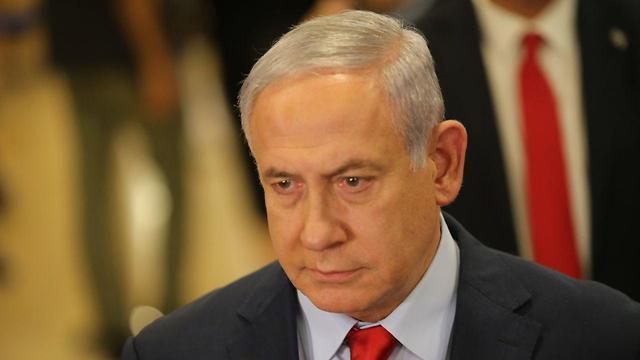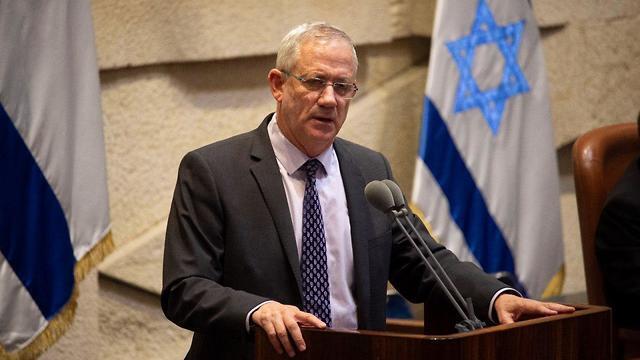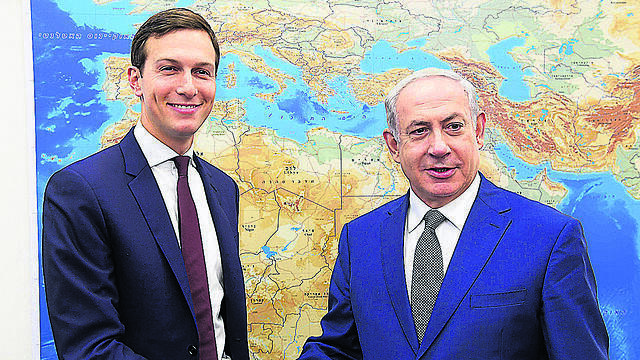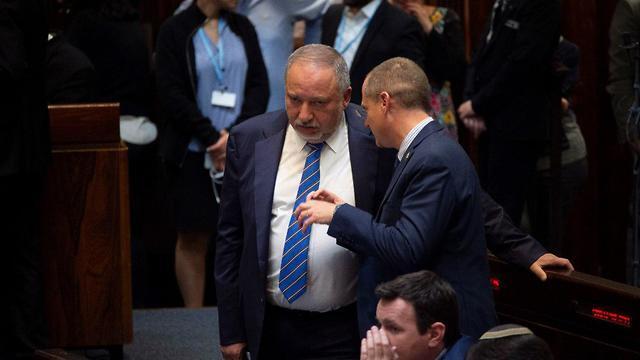Prime Minister Benjamin Netanyahu on Thursday morning defended his party's push to dissolve the Knesset and take the country to an unprecedented second national election in months, triggered by his failure to form a coalition government after the April 9 ballot.
and Twitter
“I didn’t spare any effort to avoid unnecessary elections,” Netanyahu said after the vote, lashing out at an ally-turned-rival, Avigdor Liberman, who refused the prime minister’s offers to join the government.
4 View gallery


Benjamin Netanyahu attends the Knesset vote to dissolve itself and hold fresh elections, May 29, 2019
(צילום: אלכס קולומויסקי)
He said the country was being forced to hold “unnecessary, wasteful elections because the people had their say. They didn’t have their say enough for what Mr. Liberman wants.”
The Knesset voted to dissolve itself early Thursday, sending the country to an unprecedented second snap election this year as Netanyahu failed to form a governing coalition before a midnight deadline.
The dramatic vote, less than two months after parliamentary elections, marked a setback for Netanyahu and sent the longtime leader’s future into turmoil.
Netanyahu, who has led Israel for the past decade, had appeared to capture a fourth consecutive term in the April 9 election. But infighting among his allies, and disagreements over proposed bills to protect Netanyahu from prosecution stymied his efforts to put together a majority coalition.
Rather than concede that task to one of his rivals, Netanyahu’s Likud party advanced a bill to dissolve parliament and send the country to the polls for a second time this year.
In the April 9 vote, Likud won 35 seats, on a par with its main rival Blue and White, which is headed by former army chief Benny Gantz. But wth the hardline nationalist and religious parties in his pocket, Netanyahu captured a majority of 65 seats.
The immediate cause of the crisis was his dispute with Liberman, a former aide who leads the small Yisrael Beytenu faction.
The men had clashed over Liberman’s demand to subject ultra-Orthodox religious males to the military draft, which is compulsory for most Jewish males. Without Liberman’s five Knesset seats, Netanyahu had no majority in the 120-seat Knesset.
He said the country was being forced to hold “unnecessary, wasteful elections because the people had their say. They didn’t have their say enough for what Mr. Liberman wants.”
Had the deadline passed without the vote, President Reuven Rivlin could have given another lawmaker, most likely opposition leader Gantz, an opportunity to put together a coalition.
After the vote, the Blue and White chief angrily accused Netanyahu of choosing self-preservation over allowing the country’s political process to run its course.
4 View gallery


Blue and White head Benny Gantz slams Netanyahu for calling new elelctions
(צילום: יואב דודקביץ' )
Gantz said that Netanyahu opted for “three crazy months” of a new campaign and millions of wasted dollars over new elections because he is “legally incapacitated” by looming indictments. “There is no other reason,” Gantz said.
The country now plunges into a new election campaign that will last at least three months under Israeli law. With much of the country on vacation in late August, a tentative date of Sept. 17 was set.
The campaign looks to complicate Netanyahu’s precarious legal standing. The attorney general has recommended pressing criminal charges against him in three separate corruption cases, pending a hearing scheduled for October.
Even if Netanyahu wins the election, it is unlikely he will be able to form a government and lock down the required political support for an immunity deal before an expected indictment. That would force him to stand trial and put heavy pressure on him to step aside.
The political uncertainty could also spell trouble for the White House’s Mideast peace efforts. The U.S. has scheduled a conference next month in Bahrain to unveil what it says is the first phase of its peace plan, an initiative aimed at drawing investment into the Palestinian territories.
4 View gallery


Jared Kushner and Benjamin Netanyahu meeting in the U.S.
(צילום: עמוס בן גרשום, לע"מ)
With the Palestinians, who accuse the U.S. of being unfairly biased toward Israel, opposed to the plan, and Netanyahu preoccupied with re-election, it remains unclear how the Americans will be able to proceed. President Donald Trump’s top Mideast adviser, son-in-law Jared Kushner, was in Israel and scheduled to meet with Netanyahu on Thursday.
That Netanyahu struggled to secure a majority coalition in the 120-seat parliament was a shocking turn of events for the country’s dominating political figure.
But the deeper issue is connected to Netanyahu’s legal troubles. Facing a likely indictment, he had pushed his coalition partners to pass legislation that would grant him immunity and curb the powers of the country’s Supreme Court.
Opposition parties strongly oppose granting Netanyahu immunity, robbing him of any alternatives to Liberman as he tried to form a coalition.
For the past two decades, Liberman has alternated between being a close ally and a thorn in the side of his former boss. He has held a number of senior cabinet posts, including defense minister and foreign minister.
Liberman’s base of support is fellow immigrants from the former Soviet Union, and he takes a hard line toward the Palestinians but also is staunchly secular.
He has demanded that the parliament pass pending legislation that requires young ultra-Orthodox men to be drafted into the military. Years of wide exemptions for religious men have generated resentment among the rest of Jewish Israelis, who are required to serve.
“I am not against the ultra-Orthodox community. I am for the state of Israel. I am for a Jewish state but against a Halachic state,” Liberman wrote on Facebook early Wednesday, using a term that refers to a Jewish state governed by Jewish law.
The ultra-Orthodox parties consider conscription a taboo, fearing that military service will lead to immersion in secularism, and insist the exemptions should stay in place. Netanyahu, dependent on the parties’ political support, says they have compromised enough and refuses to press them further.
Netanyahu maintained contacts with Liberman and other parties in hopes of forging a deal as a parliamentary debate took place. Many of the Likud speakers lashed out at Liberman, accusing him of forcing an unnecessary election.
But as a parliamentary debate stretched toward midnight, it became clear there would be no compromise.
A bitter Netanyahu claimed after the vote that Liberman “had no intention” to compromise and made unrealistic demands. “He is dragging the entire country for another half a year of elections,” he said.


